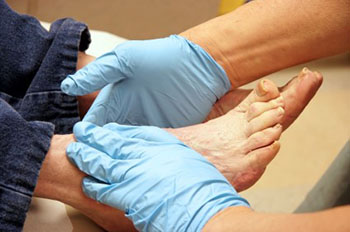How To Treat Cold Feet(Step and Requirements)

How To Treat Cold Feet: Cold feet can be caused by a variety of things, from medical conditions to simply not being dressed warmly enough. Generally speaking, treating cold feet involves addressing the underlying cause and taking steps to keep them warm. It’s not uncommon to experience cold feet, especially in the winter. Enough Info

However, if you consistently have cold feet, you can be suffering from a disorder like Reynaud’s phenomenon. To be sure there isn’t a more serious underlying disease, you may need to seek medical attention if your problems persist or you have other symptoms. Fortunately, there are a few methods you can do to get your feet warm. How To Cope With Baldness And Hair-loss
Read Also: How to Step out of Your Comfort Zone
If you want to keep your feet warm, wear thick socks
Your body heat will be trapped and retained by a pair of thick socks, which can enhance blood flow and alleviate chilly feet. Put on a pair of thick thermal socks to try and warm up your feet if they feel chilly.
- To make the socks toasty before wearing them, try putting them in the dryer.
- In your neighborhood department store’s winter clothing section, look for thermal socks, or get a pair made for cold weather online. How To Know If You Are Depressed( Best Guide)
Under warm running water, rub your feet
Your feet’s circulation can be improved with massage, which aids in warming them up. The temperature of your feet will also rise when you are in warm water. Warm up your feet by placing them under a stream of warm water, then give your feet a light massage. How To Avoid Miscommunication
- You could, for instance, sit on the edge of your bathtub with your feet in the running water. To help your feet warm up more quickly, gently rub them.
- If your skin feels frozen, avoid rubbing your feet. Visit a doctor for treatment in that situation.
To improve circulation, warm foot soaks are ideal for feet
Your feet should be submerged in warm water for 10 to 15 minutes in a footbath or basin. Your cold feet will feel better after soaking in the warm water, and it may even help the blood vessels in your feet circulate more effectively and prevent future episodes of cold feet.
- Utilize warm water from your bathtub or faucet. Avoid using hot water to avoid damaging your blood vessels and burning your feet.
- Before soaking your feet if you have diabetes, feel the water with your hands to see if it’s hot enough. 22 Top Foods For Promoting Heart Health(All You Need to Know)
To warm up more quickly, sip on some hot tea, broth, or milk
Hot drinks may help your feet warm up more quickly because they can raise your body temperature. Pick a beverage you like, then unwind while you try to warm up. Drink your beverage when it’s still warm to the touch. How To Get Rid Of Bad Thoughts
- Drink your hot beverage after attempting other methods to warm your feet for optimal results. For instance, you might rub them with menthol, massage them with running water, put on some socks, and then sip some tea.https://enoughinfo.com/how-to-treat-col…and-requirements/
Read Also: How To Gain Flexibility(Requirements)
Exercise
Do some cardio to increase blood flow. To get a decent workout that will make you sweat and get your heart pounding, try going for a long run or bike ride. Your heart’s effort to pump your blood can also aid to improve circulation in your feet, which may prevent chilly feet.
- Numerous more health advantages of regular exercise, particularly for your heart, can be cited. To maintain a healthy lifestyle and increase circulation, try to exercise for at least 30 minutes, three to four days per week.
To increase your circulation, give up smoking
Because nicotine can impair circulation, blood flow to the hands and feet, and other extremities may be reduced. If you smoke, consider giving it up to increase the blood flow to your feet, which can lessen the chill they experience. How To Make Your Hair Soft
- In addition to heart disease, smoking can also lead to other circulatory system problems.
When you should visit a doctor
Ask your doctor about it at your next checkup if you’ve noticed that you have cold feet. If you have cold feet, schedule a visit with your doctor as soon as you can, and:
You have long-lasting sores on your fingers and toes.
- Fatigue https://enoughinfo.com/how-to-treat-col…and-requirements/
- Weight fluctuates
- Fever 22 Top Foods For Promoting Heart Health(All You Need to Know)
- Joints hurt
- Noticeable alterations to your skin, including a rash or thickening of the skin
If your skin doesn’t feel chilly to the touch but your feet do, you should still call your doctor right soon. This can be a sign of a neurological disorder.
Read Also: How to Get Rid of Lower Belly Fat
If your feet remain chilly, schedule a medical checkup
Cold feet that persist could be an indication of a more serious underlying illness, such hypothyroidism. Rarely, it might be a symptom of diabetes problems or nerve damage, which your doctor may take into account. Make an appointment to visit your doctor if you frequently get chilly feet and are unable to find treatment at home. To ascertain the root of your chilly feet, they will be able to examine you and do tests.
- Additionally, your doctor will be able to suggest and prescribe medicines to help with symptom relief.
- Hormone changes during pregnancy can make you shaky. In addition to determining if you are pregnant or not, your doctor can also determine whether there are any pregnancy-related issues.
If you get skin rash, sores, or scaly patches, see a doctor right away
Make a doctor’s visit if you experience cold feet and detect changes in the skin on your feet. It can be a benign disorder like atopic dermatitis, or it might be a more serious underlying issue that needs to be addressed, such severe nerve damage.
- Get immediate medical attention to avoid infection if the sores on your toes don’t appear to be healing adequately after three to four days.
- To treat skin conditions on your feet, your doctor will be able to prescribe lotions and drugs.
If you have a fever and chilly feet, go to the doctor right away
Meningitis brought on by a severe bacterial or viral infection may manifest as fever, chills, and cold feet. When the membranes enclosing your brain and spinal cord enlarge and inflame, it is known as meningitis. If you have cold feet, a fever, or the chills, go to an emergency hospital or urgent care center right away for medical attention.
- If you live with others, be aware of their symptoms as well. Meningitis can potentially be communicable.
If you start to have joint pain, contact your doctor
Your feet’s tiny nerves and blood vessels can be impacted by rheumatoid arthritis (RA). The discomfort in your joints, such as those in your fingers or elbows, is frequently a symptom of RA. Contact your doctor if you experience joint pain along with cold feet. If they suspect you have RA in its early stages, they could ask you to schedule an appointment.
Your risk of getting RA may increase if your family has a history of the disease.
FAQs & Answers
1, What causes cold feet?
2, What are some home remedies for treating cold feet?
3, Is having cold feet a bad thing?
A healthcare professional should be consulted if you have chilly feet because while they are not always bad, they can be uncomfortable and be a sign of other underlying conditions like poor circulation or insufficient blood flow to the feet.
Read Also; How to Negotiate(Steps and Requirements}
Conclusion
It can be annoying to have cold feet, which can make daily tasks more difficult. Fortunately, there are a number of treatments for cold feet. The symptoms of chilly feet can be lessened by wearing the appropriate footwear, warming the feet, using heating pads and blankets, and treating any underlying medical issues. You ought to be able to get warm, cozy feet ultimately with the use of these remedies. Top Healthy Foods To Eat Everyday(2023 Guide)
Read Also: How To Stop Procrastinating(Tips)




